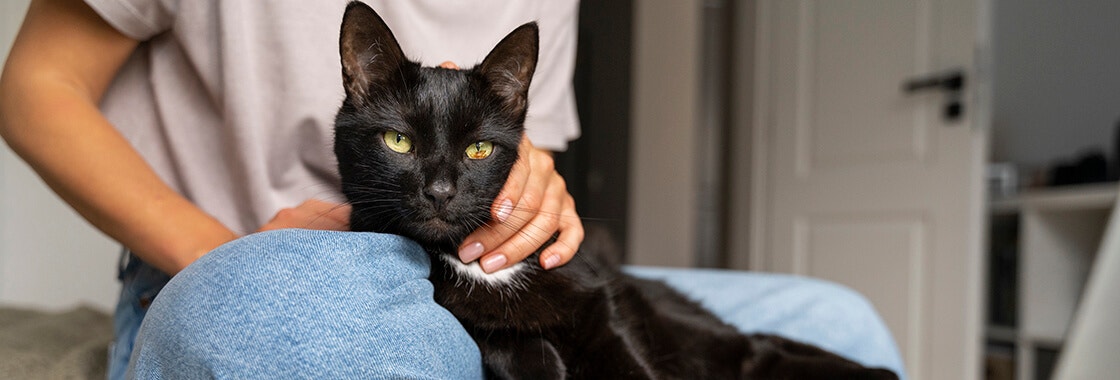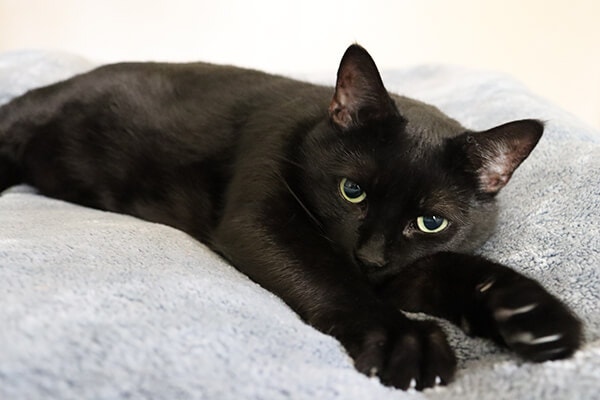- Homepage
- Blog
- Bonding & Care
- Why Cats Sit In Your Lap
Lap Cats - Reasons Why Cats Sit on Your Lap

Share
Cat parents will likely agree that there is no greater affirmation of your cat’s love than when a cat sits on your lap. Although it may have you planted on the sofa for longer than you had intended, which can be annoying if you have things to do, if a cat sits in your lap, it can make you feel like the special chosen one. This is because cats like to sit on the laps of their favourite person since they want to stay close and spend quality time together. This can be a great bonding experience for you and your cat.
There are many reasons why cats like sitting on laps, as well as reasons why your cat does not sit on your lap. Each cat is a unique individual, and depending on their breed, personality and history, their behaviours will naturally differ. However, if your cat does sit on your lap, this is a positive sign that your cat has connected with you.
In this article, we help answer the question ‘why do cats sit on laps?’ We look at different reasons why cats like to sit on laps, as well why your cat won’t sit on your lap. We also advise on how cat parents can encourage their cat to sit on their lap, amongst other topics such as how cats choose their favourite person and even why your cat sits on your laptop. By understanding your cat’s behaviour, you will be able to learn the best ways to bond with your cat and strengthen the human-feline companionship between you.
Why do cats sit on your lap?
Your lap is a combination of everything your cat craves: warmth, safety, social scent, and companionship. These are some of the reasons why your cat sits on your lap.
For companionship
Although many perceive cats to be stand-offish, they actually value their companionship with humans. In fact, when you’re away from home, your cat can sometimes feel lonely. That’s why when you come home, your cat may sit on your lap to let you know that they missed you. Cats like sitting on laps because it’s warm and comfortable, and keeps them as close as possible to their human companions - and they can keep you trapped for as long as they want (or until you have the courage to disturb them).
For attention
Cats also like to sit on laps because it puts them in the perfect position to receive attention. By adorably curling up in your lap, your cat expects that you will pet them - and they will lap up any opportunity for that. If you’re wondering why cats purr loudly, it’s usually because they’re happy with all the attention they’re receiving. It’s also possible that the petting is reminiscent of how their mother would groom them as a kitten, and they enjoy this connection with you too.
For warmth
Cats are intrinsically warm, with a body temperature of 38-39.2 degrees celsius. However, body temperature can drop when cats are sleeping. For this reason, cats tend to seek out warm places to nap - whether it’s near the radiator, in the sunshine or on your lap. Cats like sitting on laps as they radiate heat, and therefore it requires less energy for your cat to maintain their body temperature and makes it easier for them to stay warm. The good news is, your cat’s body heat will keep you cosy too!
For security
Like any animal, cats feel most vulnerable when they’re asleep. This is because when cats sleep in the wild, they are exposed to potential threats and sleeping can make an attack from a predator more likely. One of the reasons why cats sit in your lap is because they feel safer sleeping near you, which enables them to relax and rest without worrying. It also allows your cat to be higher up than the ground, which makes them feel more secure as they have a better vantage point. This is also why cats like sleeping on the bed.
For familiarity
Cats use their senses to explore their environment and are extremely sensitive to sounds and smells. Your cat may sit on your lap because they’re familiar with your scent and it offers them comfort. It’s also possible that the natural sounds that your body makes, such as the sound of your breathing and your heart beating, can be like white noise for your cat. This familiarity adds to your cat’s sense of security and comfort, allowing them to sleep soundly.
For comfort
You may have noticed that cats sit on your lap when you’re wearing something comfortable - and cats won’t sit on your lap if you’re not. Cats love to be cosy and enjoy certain textures more than others. For example, if you’re wearing a soft jumper or bathrobe, and your cat sits in your lap, be prepared to sit for longer as your cat enjoys their comfy snooze. On the other hand, if you’re wondering why your cat won’t sit on your lap - take a look at your outfit and consider whether it offers enough comfort.
For affection
Cats show affection with specific behaviours. The reason why cats sit on laps is because they’re expressing their love for you. Cats like sitting on the laps of their favourite humans, and you’ve likely achieved this status by taking care of your cat’s daily needs - and they want to return the favour by gracing you with their presence. Your cat will also know that they will receive affection in return - whether it be through praise, strokes or treats.
For territory
As territorial creatures, cats have specific scent glands that release pheromones when your cat rubs themselves against objects or people. These pheromones will have a scent that is individual to your cat and therefore helps them to establish their territory. One of the reasons why cats sit on your lap could be to mark their scent on you and let other cats know that you belong to them!
For relaxation
We know that cats love to nap - and sometimes they need a peaceful place to unwind and rejuvenate. Since you signify comfort and security for your cat, it’s no wonder your cat sits in your lap to relax for a snooze. Remember that sleeping is a favourite activity for cats, so it’s a positive sign if they want to share this time with you.
For social interaction
While cats are thought to be independent creatures, they enjoy social interaction with their humans. If you’re usually away from home during the day, your cat will value the quality time they get to spend with you in the evening. Even if you’re just relaxing on the sofa, your cat may sit on your lap to engage with you socially and feel a part of your activities.
Why won’t your cat sit on your lap?
You may wonder why your cat does not sit on your lap, and there are various answers to this. If your cat sits on some people’s laps but not others, it’s likely that they have their favourites. They may have developed a special bond with this person, especially if this person takes care of their daily needs, such as feeding and playing with them. They may also be more familiar with this person’s scent, or particularly enjoy the texture of their clothing.
However, if your cat won’t sit on any lap, this could be due to their personal history. If cats don’t have a proper socialisation period as kittens, they may struggle with social interaction as they get older. It’s also possible that your cat has had a difficult experience, such as an abusive past or traumatic event. This may cause your cat to be wary of you, and other humans, due to their experience with people.
It’s also important to remember that each cat is an individual and therefore they have different personalities and behaviours. Certain cat breeds are more likely to be lap cats, such as Ragdolls, whilst other cats prefer to sit next to or near you, or even enjoy their personal space. If the reason why your cat doesn’t sit on your lap is because they simply don’t want to, there are plenty of other ways you can bond with your cat.
Can you train your cat to sit on your lap?
It is possible to train cats to sit on your lap by using positive reinforcement. You can begin by sitting near your cat and petting them, offering rewards such as treats and praise to encourage the behaviour. Then, you can move your cat onto your lap gently, whilst observing their behaviour to make sure they’re happy with the arrangement. Continue petting your cat and reward them for sitting on your lap so that they can create positive associations with the experience.
It’s important to never force cats to sit on your lap, as this may cause distrust between you and can lead to aggressive behaviours. By giving your cat the freedom to move away if and when they want to, your cat will feel more comfortable and in control of the situation, which will help them to trust you. Also, cats show affection in different ways, so don’t worry if your cat doesn’t sit on your lap. Instead, you can bond with them in ways that they enjoy!
Lap Cats: FAQs
How do cats choose their favourite person?
Cats usually choose their favourite person depending on who offers positive feelings and experiences. This is often the person who takes care of the cat’s daily needs, such as feeding and playtime. Cats also value consistency, respect and boundaries - and this can help you become your cat’s favourite person.
Why do cats sit on laptops?
The reason why cats sit on laptops is because laptops generate heat, and cats are naturally drawn to warm places. If you spend a lot of time on your laptop, it’s possible that your cat is disrupting your work so you redirect your attention to them - for play or petting.
How do cats show affection?
Cats show affection in many ways. While some cats like to sit on laps, they can also express their feelings with behaviours such as purring, kneading, head-butting and slowly blinking at their favourite person. Your cat may also follow you around the house, which shows their desire for your company.
It’s natural to want to spend as much time as possible with your cat, including your cat sitting on your lap. Quality time allows the opportunity for you and your cat to develop a strong and secure bond together. However, it’s important that cat parents never force their cats into situations they’re not comfortable with, as this can cause distrust and your cat may become more wary of you. If your cat doesn’t want to sit in your lap, there are many other ways you can bond with them and you can learn more about how to get a cat to like you.











